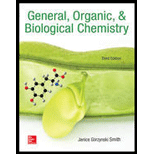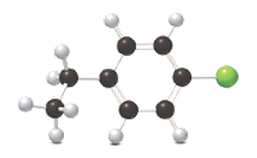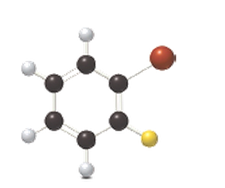
EBK GENERAL, ORGANIC, & BIOLOGICAL CHEM
3rd Edition
ISBN: 9781259298424
Author: SMITH
Publisher: VST
expand_more
expand_more
format_list_bulleted
Concept explainers
Question
Chapter 13, Problem 13.77P
Interpretation Introduction
(a)
Interpretation:
The name of the aromatic compound needs to be deduced based on the following ball and stick model:

Concept Introduction:
Aromatic compounds are predominantly characterized by the presence of a benzene (C6H6)ring- The parent ring can be identified based on the principal
functional groups attached to the carbon atoms in the ring. These groups could be methyl ( -CH3 which gives toluene), amino (-NH2 which forms aniline), hydroxyl (-OH which forms phenol) and so on. - If two or more substituents are present in the ring, the substituents are named in alphabetical order and the ring is numbered such that the first substituent gets the lowest number order.
Interpretation Introduction
(b)
Interpretation:
The name of the aromatic compound needs to be deduced based on the following ball and stick model:

Concept Introduction:
- Aromatic compounds are predominantly characterized by the presence of a benzene (C6H6)ring
- The parent ring can be identified based on the principal functional groups attached to the carbon atoms in the ring. These groups could be methyl ( -CH3 which gives toluene), amino (-NH2 which forms aniline), hydroxyl (-OH which forms phenol) and so on.
- If two or more substituents are present in the ring, the substituents are named in alphabetical order and the ring is numbered such that the first substituent gets the lowest number order.
Expert Solution & Answer
Want to see the full answer?
Check out a sample textbook solution
Students have asked these similar questions
Name the following aromatic compounds.
Define Aromatic Compounds with More Than One Ring ?
What are the factors that confer Aromaticity to an organic molecule?
Chapter 13 Solutions
EBK GENERAL, ORGANIC, & BIOLOGICAL CHEM
Ch. 13.1 - Convert each condensed structure to a complete...Ch. 13.1 - Prob. 13.2PCh. 13.1 - Complete the structure of zingiberene, a component...Ch. 13.2 - Prob. 13.4PCh. 13.2 - Prob. 13.5PCh. 13.2 - Prob. 13.6PCh. 13.3 - Prob. 13.7PCh. 13.3 - Prob. 13.8PCh. 13.3 - Prob. 13.9PCh. 13.3 - Prob. 13.10P
Ch. 13.3 - Prob. 13.11PCh. 13.3 - Prob. 13.12PCh. 13.3 - Prob. 13.13PCh. 13.4 - Prob. 13.14PCh. 13.6 - Prob. 13.15PCh. 13.6 - Prob. 13.16PCh. 13.6 - Prob. 13.17PCh. 13.6 - Prob. 13.18PCh. 13.6 - Prob. 13.19PCh. 13.7 - Prob. 13.20PCh. 13.8 - Prob. 13.21PCh. 13.8 - Prob. 13.22PCh. 13.10 - Give the IUPAC name of each compound.
Ch. 13.10 - Prob. 13.24PCh. 13.11 - Prob. 13.25PCh. 13.12 - Prob. 13.26PCh. 13.13 - Prob. 13.27PCh. 13.13 - Prob. 13.28PCh. 13 - Anethole, the major constituent of anise oil, is...Ch. 13 - Prob. 13.30PCh. 13 - What is the molecular formula for a hydrocarbon...Ch. 13 - Prob. 13.32PCh. 13 - Prob. 13.33PCh. 13 - Prob. 13.34PCh. 13 - Prob. 13.35PCh. 13 - Prob. 13.36PCh. 13 - Give the IUPAC name for each molecule depicted in...Ch. 13 - Give the IUPAC name for each molecule depicted in...Ch. 13 - Give the IUPAC name for each compound. a....Ch. 13 - Give the IUPAC name for each compound. d....Ch. 13 - Prob. 13.41PCh. 13 - Prob. 13.42PCh. 13 - Give the structure corresponding to each IUPAC...Ch. 13 - Prob. 13.44PCh. 13 - Each of the following IUPAC names is incorrect....Ch. 13 - Each of the following IUPAC names is incorrect....Ch. 13 - Prob. 13.47PCh. 13 - Prob. 13.48PCh. 13 - Prob. 13.49PCh. 13 - Label the carbon-carbon double bond as cis or...Ch. 13 - Prob. 13.51PCh. 13 - Prob. 13.52PCh. 13 - Prob. 13.53PCh. 13 - Prob. 13.54PCh. 13 - Prob. 13.55PCh. 13 - Prob. 13.56PCh. 13 - Prob. 13.57PCh. 13 - Prob. 13.58PCh. 13 - Prob. 13.59PCh. 13 - Prob. 13.60PCh. 13 - What alkyd halide is formed when each alkene is...Ch. 13 - Prob. 13.62PCh. 13 - Prob. 13.63PCh. 13 - Prob. 13.64PCh. 13 - What alkene is needed as a starting material to...Ch. 13 - Prob. 13.66PCh. 13 - Prob. 13.67PCh. 13 - Prob. 13.68PCh. 13 - Prob. 13.69PCh. 13 - Prob. 13.70PCh. 13 - Prob. 13.71PCh. 13 - Prob. 13.72PCh. 13 - Prob. 13.73PCh. 13 - Prob. 13.74PCh. 13 - Prob. 13.75PCh. 13 - Prob. 13.76PCh. 13 - Prob. 13.77PCh. 13 - Prob. 13.78PCh. 13 - Prob. 13.79PCh. 13 - Prob. 13.80PCh. 13 - Prob. 13.81PCh. 13 - Are o-bromochlorobenzene and m-bromochlorobenzene...Ch. 13 - Give the structure corresponding to each IUPAC...Ch. 13 - Give the structure corresponding to each IUPAC...Ch. 13 - Prob. 13.85PCh. 13 - Prob. 13.86PCh. 13 - Prob. 13.87PCh. 13 - Prob. 13.88PCh. 13 - Prob. 13.89PCh. 13 - Prob. 13.90PCh. 13 - Prob. 13.91PCh. 13 - Prob. 13.92PCh. 13 - Prob. 13.93PCh. 13 - Eleostearic acid is an unsaturated fatty acid...Ch. 13 - Prob. 13.95PCh. 13 - Prob. 13.96PCh. 13 - Prob. 13.97PCh. 13 - Prob. 13.98PCh. 13 - Prob. 13.99PCh. 13 - Prob. 13.100PCh. 13 - Prob. 13.101PCh. 13 - Prob. 13.102PCh. 13 - Answer the following questions about compound A,...Ch. 13 - Prob. 13.104PCh. 13 - Prob. 13.105PCh. 13 - Prob. 13.106PCh. 13 - Prob. 13.107CPCh. 13 - Prob. 13.108CP
Knowledge Booster
Learn more about
Need a deep-dive on the concept behind this application? Look no further. Learn more about this topic, chemistry and related others by exploring similar questions and additional content below.Similar questions
arrow_back_ios
arrow_forward_ios
Recommended textbooks for you
- Chemistry: Matter and ChangeChemistryISBN:9780078746376Author:Dinah Zike, Laurel Dingrando, Nicholas Hainen, Cheryl WistromPublisher:Glencoe/McGraw-Hill School Pub Co
 Chemistry for Today: General, Organic, and Bioche...ChemistryISBN:9781305960060Author:Spencer L. Seager, Michael R. Slabaugh, Maren S. HansenPublisher:Cengage Learning
Chemistry for Today: General, Organic, and Bioche...ChemistryISBN:9781305960060Author:Spencer L. Seager, Michael R. Slabaugh, Maren S. HansenPublisher:Cengage Learning  General, Organic, and Biological ChemistryChemistryISBN:9781285853918Author:H. Stephen StokerPublisher:Cengage Learning
General, Organic, and Biological ChemistryChemistryISBN:9781285853918Author:H. Stephen StokerPublisher:Cengage Learning Organic And Biological ChemistryChemistryISBN:9781305081079Author:STOKER, H. Stephen (howard Stephen)Publisher:Cengage Learning,
Organic And Biological ChemistryChemistryISBN:9781305081079Author:STOKER, H. Stephen (howard Stephen)Publisher:Cengage Learning, Principles of Modern ChemistryChemistryISBN:9781305079113Author:David W. Oxtoby, H. Pat Gillis, Laurie J. ButlerPublisher:Cengage Learning
Principles of Modern ChemistryChemistryISBN:9781305079113Author:David W. Oxtoby, H. Pat Gillis, Laurie J. ButlerPublisher:Cengage Learning

Chemistry: Matter and Change
Chemistry
ISBN:9780078746376
Author:Dinah Zike, Laurel Dingrando, Nicholas Hainen, Cheryl Wistrom
Publisher:Glencoe/McGraw-Hill School Pub Co


Chemistry for Today: General, Organic, and Bioche...
Chemistry
ISBN:9781305960060
Author:Spencer L. Seager, Michael R. Slabaugh, Maren S. Hansen
Publisher:Cengage Learning

General, Organic, and Biological Chemistry
Chemistry
ISBN:9781285853918
Author:H. Stephen Stoker
Publisher:Cengage Learning

Organic And Biological Chemistry
Chemistry
ISBN:9781305081079
Author:STOKER, H. Stephen (howard Stephen)
Publisher:Cengage Learning,

Principles of Modern Chemistry
Chemistry
ISBN:9781305079113
Author:David W. Oxtoby, H. Pat Gillis, Laurie J. Butler
Publisher:Cengage Learning